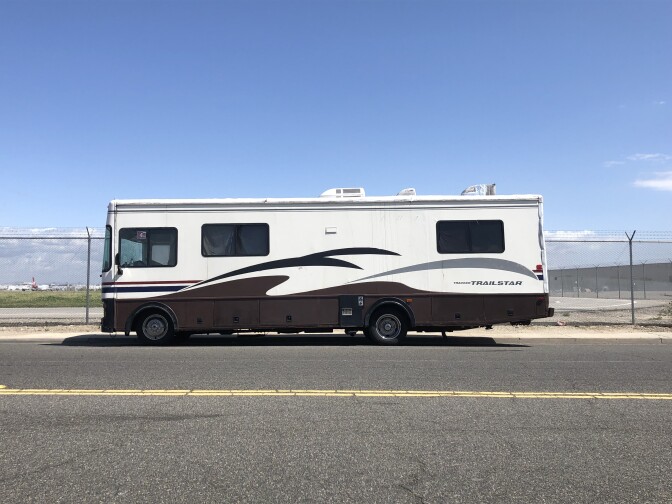This story is free to read because readers choose to support LAist. If you find value in independent local reporting, make a donation to power our newsroom today.
Long Beach to use Supreme Court's Grants Pass ruling to clear encampments of unhoused people

Long Beach will join a growing list of California cities who say they will ticket unhoused people for camping or sleeping in public in the wake of a recent Supreme Court decision.
Until recently, cities nationwide were prevented from citing, fining, or arresting unhoused people for camping if no city-provided shelters were available. That all changed when the U.S. Supreme Court overturned those legal protections in the Grants Pass decision.
Now, according to a recent memo by city officials, Long Beach will use that authority to enforce its anti-camping ordinances, particularly for encampments, if people refuse services or housing. That means police can issue a misdemeanor trespassing citation to any person sleeping in public, which is punishable by up to six months in jail and a $1,000 fine.
What this means for Long Beach
There are 3,376 people experiencing homelessness in Long Beach as of January, according to the city’s 2024 point-in-time count. More than two thirds were unsheltered, including people living in cars, RVs, and tents.
The city’s public works teams responded to 3,200 encampments in the last year, according to the memo. Long Beach has an inventory of about 1,300 shelter beds, which is only enough to shelter about 38% of its unhoused population.
In general, the city will respond to people experiencing homelessness through outreach and offering services, but misdemeanor citations can be issued under the city’s anti-camping ordinance if repeated attempts are refused.
People or encampments who could be in physical danger, including those in unsafe vacant structures or areas at risk of storms, can also be cited. The police and fire departments can also use citations to “compel” encampments to move to safer areas, according to the memo.
City officials wrote that they will identify encampments that have already been offered services and shelter, those that cause significant access issues for public space or resources, or pose significant public health or safety concerns.
From there, its interdepartmental homelessness team will focus on “intensive outreach” and notify people they need to move out of the area. The city can issue misdemeanor citations in priority focus areas if those outreach opportunities don’t work.
“If every location is a priority, no area is a priority, and the team will be ineffectual in its response,” Teresa Chandler, deputy city manager, wrote in the memo.
Potential drawbacks
Long Beach officials say the penalty for a camping offense would usually result in a fine, adding that significant jail time is unlikely. According to the memo, those penalties “do little to reduce overall rates of homelessness, and could create additional barriers for people to access housing and services.”
Eve Garrow, a policy analyst with the American Civil Liberties Union of Southern California, told LAist that if every city engages in tactics that displace people, nobody wins.
“[That’s] because we're not actually investing in the housing and services that we need to solve the issue,” Garrow said, “This is the real problem. Blaming people for being service resistant, for not accepting services when those services are either ineffective, inhumane or not available, is the ultimate form of gaslighting.”
Long Beach officials did not immediately respond to a request for comment.
What’s next
The approach starts this month, unless the mayor or City Council provides additional direction. But the memo noted that anti-camping ordinances could still be vulnerable to legal challenges, especially “if the only enforcement mechanism is the issuance of criminal sanctions.”
City officials will review the plan and its effects over the next six months. Officials will also work to identify additional resources, including more funding for motel vouchers or shelters, expanding permanent housing resources, and additional staffing.
“We are asking for everyone’s understanding of the complexity of this most difficult of societal issues and hope this new approach will allow for a balanced yet effective response to the city’s most pressing and difficult challenge,” Chandler wrote in the memo.







